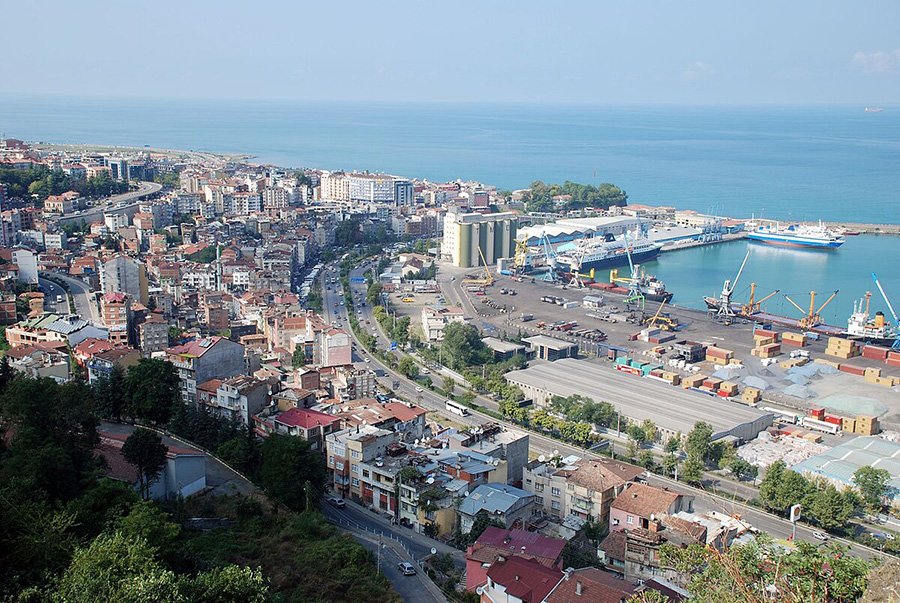
Photo: Wikimedia
The Turkish Statistical Institute TÜİK analyzed life satisfaction levels across the country. The results were surprising: Trabzon ranked first among Turkey’s unhappiest cities. Other major centers of dissatisfaction include Antalya, Izmir, Ankara, and Istanbul.
Trabzon, home to around 818,000 people, reported that 11.79% feel unhappy, placing it at the top of the discontent list. Known as a Black Sea hub, port city, and tourist destination, Trabzon is associated with greenery, the sea, and hospitality. Many locals insist it is hard to be unhappy in such a city, yet statistics suggest otherwise.
Antalya came second with 11.7% of its 2.68 million residents unhappy. As one of Turkey’s largest tourist centers, its economy is heavily dependent on tourism, where seasonal fluctuations and high living costs create additional strain.
Izmir followed with 10.65% dissatisfaction. Despite its reputation as one of Turkey’s most livable cities with a population of 4.5 million, traffic congestion and soaring housing prices weigh heavily on residents.
Ankara ranked fourth with 9.95%. Despite being the capital with nearly 5.8 million people, broad job opportunities, and developed infrastructure, stress and rising expenses reduce perceived well-being.
Samsun came fifth (9.72%), a key Black Sea city of 1.36 million, struggling with youth migration and employment issues.
Istanbul, Turkey’s largest metropolis with almost 16 million people, ranked sixth (9.12%). Overcrowded infrastructure, high prices, and the city’s intense pace fuel stress and dissatisfaction.
Other cities in the top ten include Çorum (9.10%), Ordu (8.75%), and Gümüşhane (7.68%), despite the latter’s small population of just 144,000.
[img]https://internationalinvestment.biz/uploads/posts/2025-08/rating_turkey_unhappy_cities.jpg[/img
]
]
At the other end of the scale is Sinop, where 77.7% of residents call themselves happy. Similar figures were recorded in Afyonkarahisar (76.4%) and Bayburt (75.9%).
Earlier TÜİK published similar life satisfaction research. In 2023, 52.7% of Turks said they were happy; in 2024, that fell to 49.6%. Meanwhile, the share of unhappy people rose from 13.7% to 14.5%. Average life satisfaction scored 5.7 out of 10.
Generational differences were notable. Happiness rose slightly among 25–34 year-olds (from 50.7% to 51%), but fell among middle-aged and older groups: down 7.1 points for ages 45–54, 2.2 points for ages 55–64, and 1.9 points for those 65+.
Gender differences also appeared: men’s happiness dropped from 50.3% to 46.9%, women’s from 55.1% to 52.3%. Among married people, 52.5% were happy versus only 44% of singles.
In 2024, family remained the key source of well-being (72.9%), followed by children (13.2%) and health (68.3%). Love, success, money, and work were less frequently cited.
Public services scored relatively high satisfaction: safety (72.1%), transportation (67.4%), healthcare (63.2%), followed by education, justice, and social services.
The biggest problem identified by 29.2% of respondents was the rising cost of living, followed by education (15.7%), poverty (14.0%), judiciary (8.2%), terrorism (6.4%), unemployment (5.6%), and migration (5.5%).
[img]https://internationalinvestment.biz/uploads/posts/2025-08/life-satisfaction-problems.jpg[/img
]
]
The contrast between unhappy megacities and more content smaller towns highlights the uneven quality of life across Turkey. Trabzon and Sinop, both on the Black Sea, demonstrate that natural beauty and infrastructure alone cannot offset economic pressure and rising costs. Still, family and health remain the strongest foundations of personal happiness, helping to maintain balance amid growing social and economic challenges.
Подсказки: Trabzon, Turkey, life satisfaction, unhappy cities, TÜİK, Antalya, Izmir, Ankara, Istanbul, cost of living, quality of life








